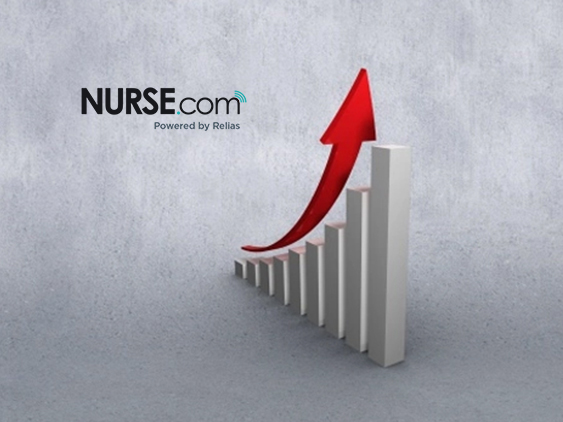Nurse.com, a Relias company and the trusted go-to resource for nurses all over the world, released their 2022 Nurse Salary Research Report, identifying and analyzing trends related to US nurses’ views of their jobs and satisfaction in their roles. The report revealed that while salaries increased for some groups, there is significant concern about pay equity, especially among nurses who identify as BIPOC (Black, Indigenous, and People of Color) and women, as the gender pay gap for registered nurses has not only continued to widen but nearly doubled in the last two years. These heightened feelings among nurses of being underpaid, at a time of unprecedented stress on the healthcare system due to the pandemic, may result in more veteran nurses leaving the profession or changing employers.
Nurse.com surveyed 2,516 respondents, 87% of which were registered nurses (RNs), 5% of which were advanced practiced registered nurses (APRNs), and 8% of which were licensed practical nurses or licensed vocational nurses (LPN/LVNs). The study, which was conducted between November and December 2021, comprehensively examined how nurses felt about their pay at a pivotal time – 20 months into the COVID-19 pandemic – and how these feelings may impact nurse staffing in the future.
HR Technology News: Apex HCM Redefines The Payroll Experience For Employers
Numerous studies have pointed to widespread feelings of dissatisfaction, burnout, and turnover among nursing professionals. The Nurse.com study found that 28% of nursing professionals had changed work settings in 2020 and 2021, and 47% were open to new opportunities. 29% of nurses across all licensures are considering leaving the profession — an 18% jump from the 2020 survey. The largest percentages were seen among nurses at the beginning of their careers (ages 18-24) and more experienced nurses (ages 65+).
In this survey, other key findings include:
- Salaries up overall: The median RN salary reported by respondents was $78,000, an increase over the median RN salary of $73,000 in 2020.
- Widening gender pay gap: The median salary for an RN identifying as male ($90,000) is $14,000 higher than the median salary of an RN identifying as female ($76,000). This gap was $7,297 in Nurse.com’s 2020 study. 4 RNs in the study identified as nonbinary, and their median salary was $84,000. 40% of male RNs said they “always” or “most of the time” try to negotiate a higher salary, compared to 31% of women.
- Pay equity concerns among BIPOC professionals: Nurses who identify as Black, African American, American Indian, or Alaska Native reported the lowest levels of satisfaction with their current salary. These groups also reported working the longest hours, and nurses identifying as Black or African American reported working the most overtime hours.
- Shift toward travel nursing: With escalating demand and higher pay, more nurses are considering becoming travel nurses. About 4% of respondents said they were travel nurses, with 62% becoming travel nurses in 2020 or 2021.
- Younger nurses considering changing employers: 23% of millennials are actively looking to change employers, compared to 17% of nurses overall. The overwhelming majority (73%) of Generation Z nurses are open to new opportunities.
- Training opportunities available: 46% of nurses said they plan to pursue training as a way to boost their salary, with 34% planning to pursue a degree. LPN/LVNs are more likely to pursue additional education than nurses with other license types, with APRNs least likely.
HR Technology News: Millennium Corp Unlocks The Power Of Infused Analytics With Sisense, Bolstering Accountability Across Its Businesses
“Nurse staffing shortages exceeded crisis levels during the pandemic, and while pay has risen for many nurses, a substantial number of nurses are still feeling underpaid and overworked,” said Felicia Sadler, MJ, BSN, RN, CPHQ, LSSBB, Nurse.com ambassador and Patient Safety & Quality Executive at Relias. “Frontline nurses are the backbone of care delivery and it’s vital that they feel valued and rewarded. This report serves as a decision-making handbook for nurses as they evaluate their roles and navigate their career development, as well as a guide for employers as they seek to better understand how to address the inequities in their workforces and strengthen their organizations.”
“It’s more important than ever that all nursing professionals feel supported as they continue to face challenges daily as a result of the pandemic,” said Trish Richardson, MSN, BSBA, RN, NE-BC, CMSRN, Nurse.com ambassador and Clinical Executive Consultant at Relias. “As a nurse educator, I’d recommend that organizations assess their current training, professional development and career pathing offerings including clinical pathways and mentor programs to ensure employees are supported at every stage of their career. Considering long-standing racial pay disparities, I encourage all of my peers, and especially nurses of color, to continue advocating for themselves, negotiating for higher salaries and securing pay equity. Florence Nightingale’s sentiment that nurses should continue learning all of our lives remains relevant today. I propose we heed the call and continue our education and pursue advanced degrees and specialty certifications. You see, whether through your employer or independent study, advanced training and education opens up a world of opportunities and well positions you for future successes.”
HR Technology News: New Initiative To Advance Employment Opportunities For Youth And Adults With Criminal Records
[To share your insights with us, please write to sghosh@martechseries.com]

